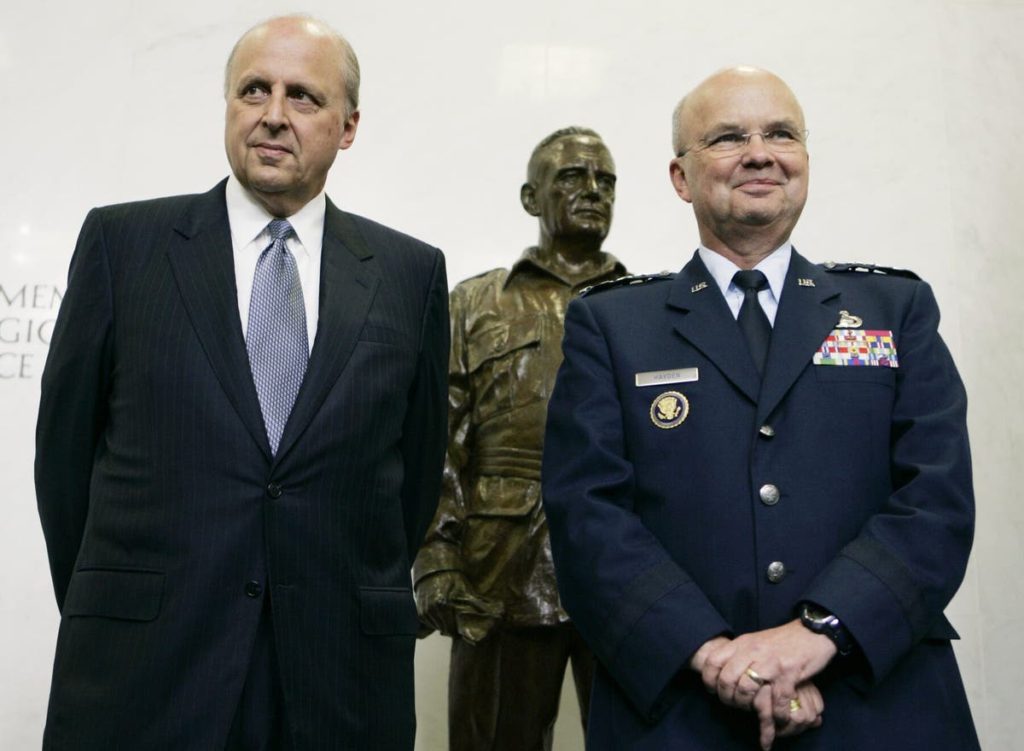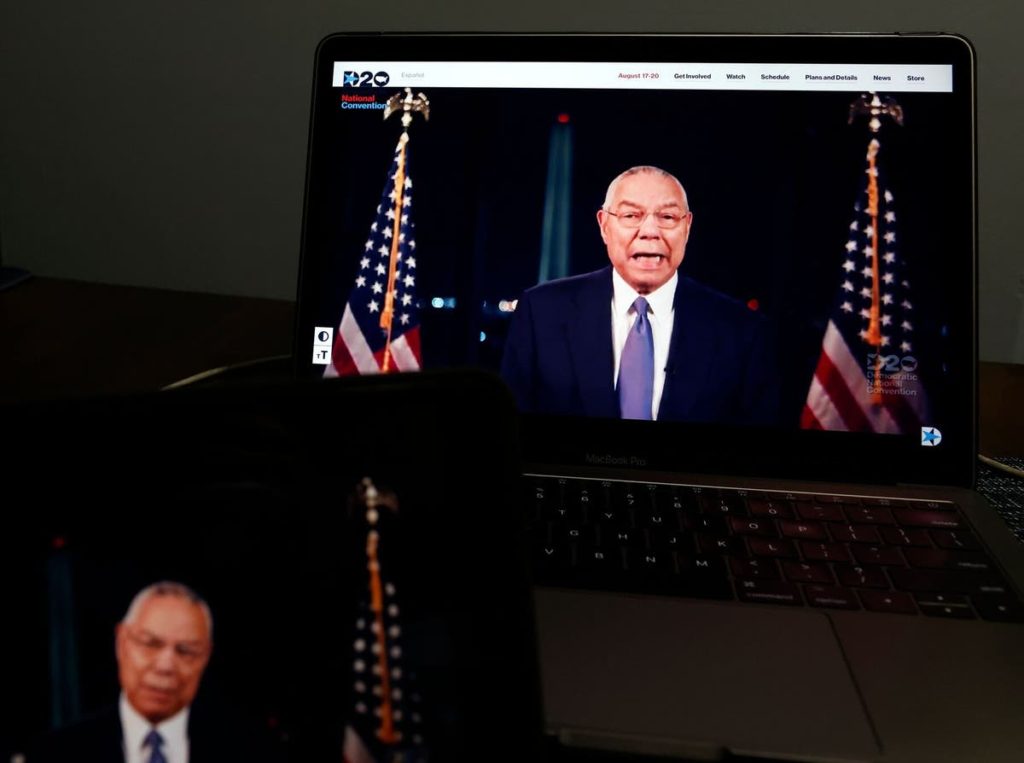In a letter released hours before Joe Biden is set to deliver his nomination acceptance speech, over 70 senior officials called President Trump “unfit to lead” and outlined their support for his opponent.
Four years after 50 of the nation’s most senior Republican national security officials warned that Donald J. Trump “would be the most reckless president in American history,” they are back with a new letter, declaring his presidency worse than they had imagined and urging voters to support former Vice President Joseph R. Biden Jr.
The new letter, released just hours before Mr. Biden formally accepts the nomination, lays out a 10-point indictment of Mr. Trump’s actions, accusing him of undermining the rule of law, aligning himself with dictators and engaging “in corrupt behavior that renders him unfit to serve as president.”
They also accused him of “spreading misinformation” and “undermining public health experts,” making him “unfit to lead during a national crisis.”
“When we wrote in 2016, we were warning against a vote for Donald Trump, but many of the signatories were not ready to embrace his opponent,” Hillary Clinton, the former secretary of state, noted John Bellinger, a former legal adviser at the State Department and National Security Council who was among the authors of the past and current letters. “This is different: Each of the signatories has said he or she will vote for Biden. Signatories are now even more concerned about Trump, and have fewer concerns about Biden.”
Eric Edelman, a former senior Defense Department official under President George W. Bush, and a signatory to both the old and new letters, noted that the 2016 warnings were “a prospective judgment about Donald Trump’s fitness for office. Today the things that were cited in those letters have been vindicated by Trump’s actual performance.”
The result, he said, was that new Republican signatories joined — there are more than 70 in the new letter — people who “undoubtedly hoped that Trump would grow in office and would take the responsibilities of office seriously. He didn’t.”
For the Democratic National Convention, Mr. Biden has invited a series of Republicans to speak, most notably Colin L. Powell, the former secretary of state and chairman of the Joint Chiefs of Staff. Democrats are betting that these cross-aisle endorsements may bring over moderate Republicans who may have supported Mr. Trump four years ago, but are struggling with whether they can vote for a Democrat.
“While some of us hold policy positions that differ from those of Joe Biden and his party, the time to debate those policy differences will come later,” the new letter says. “For now, it is imperative that we stop Trump’s assault on our nation’s values and institutions and reinstate the moral foundations of our democracy.”
The letter was released by DefendingDemocracyTogether.org, an advocacy group created in 2018 by anti-Trump Republicans and conservatives. They are spending about $20 million to oppose him, the group says, including placing the full letter in an ad in The Wall Street Journal on Friday.
Among the signatories are former officials from the Reagan administration; others who served both George Bush and George W. Bush; and a few, like John Negroponte, the former director of national intelligence, and General Michael Hayden, who served as director of the Central Intelligence Agency and the National Security Agency and whose service extended over both Democratic and Republican administrations.
The letter also includes a handful of midlevel officials who served under Mr. Trump. But the list of signatories misses most of the biggest names in national security who entered the administration, only to be fired or resign. Among those missing are Rex Tillerson, the former secretary of state, and three former generals who served in high posts: John Kelly, the former chief of staff; H.R. McMaster, the former national security adviser; and Jim Mattis, the former defense secretary.
John R. Bolton, who was fired as national security adviser last year, has said publicly that he would not vote for Mr. Trump, but has refused to embrace Mr. Biden, saying he would write in a conservative Republican instead.
When the first letter was released in 2016, it had some shock value: No one could recall when established national security leaders had abandoned the party’s nominee. Today, the critiques sound more familiar, though the new letter picks through more than three years of international chaos to argue that Mr. Trump has “gravely damaged America’s role as a world leader” by mocking allies, and soliciting foreign influence in American elections.
As the most recent letter laid out, Mr. Trump “proclaimed his ‘love’ and ‘great respect’ for the North Korean strongman Kim Jong-un, endorsed ‘brilliant leader’ Xi Jinping’s move to serve as China’s president for life,” and “repeatedly sided with Vladimir Putin against our own intelligence community.”
Yet within the Republican national security establishment, there are arguments about whether such letters actually harm Mr. Trump or help him.
Peter Feaver, a veteran of the Clinton and Bush administrations, who helped draft several versions of the 2016 letter, decided not to sign the one released on Thursday.
“I don’t regret signing the 2016 letters, and I think the new letter is accurate in its critique of Trump’s performance,” Mr. Feaver, a professor at Duke University, said in an interview.

Colin Powell, the former U.S. Secretary of State, spoke in support of Mr. Biden during the virtual Democratic National Convention on Tuesday. Jason Szenes/EPA, via Shutterstock
d of the United States. He continued the theme this week, retweeting a message that called Mr. Powell “a Neocon WMD hoaxer” who had endorsed the “Establishment’s puppet,” Mr. Biden.
The 2016 letter had another effect: It disqualified a raft of Republicans from serving in the Trump White House, including many who would have provided a much deeper bench of experienced officials. Republicans split in 2017 between those who refused to served under Mr. Trump and others, like Mr. Tillerson and Fiona Hill, the Russia expert who joined the National Security Council and later testified at impeachment hearings about Mr. Trump’s actions in Ukraine, who believed they had an obligation to try to guide his foreign policy.
But in private, they were often accused of quietly undermining his policies or acting as secret sympathizers with the “Never Trump” movement. Mr. Tillerson was finished, officials said, as soon as he was widely reported to have described Mr. Trump as “a moron” after a briefing — an account Mr. Tillerson never denied.
Prof. Feaver said that should Mr. Trump win in November, “the pool of potential officeholders will be even thinner in 2021.”
FEATURED IMAGE: Among the signatories are former officials like John Negroponte, left, the former director of national intelligence, and General Michael Hayden, who served as director of the Central Intelligence Agency and the National Security Agency. Larry Downing/Reuters
By David E. Sanger/The New York Times






